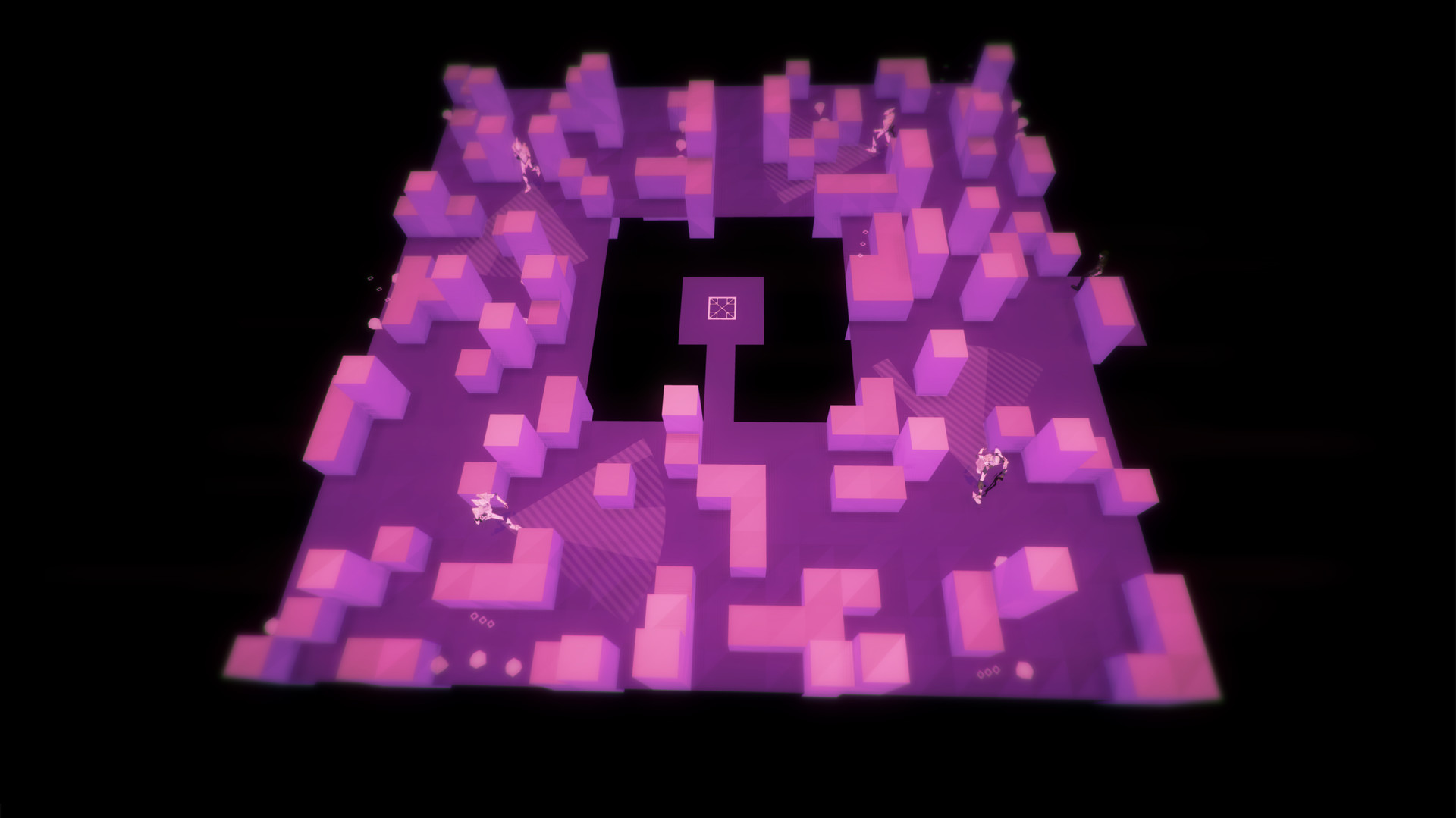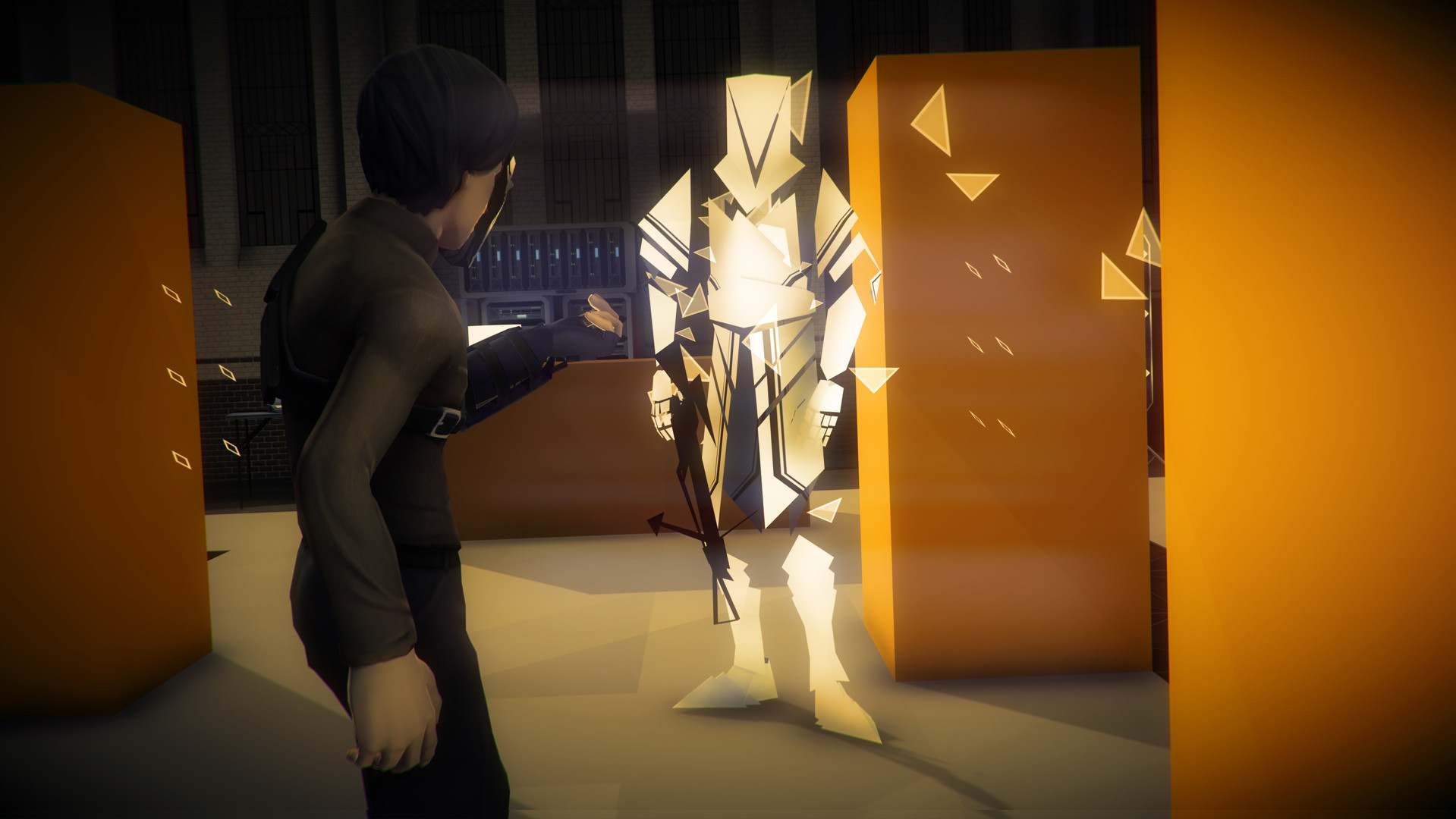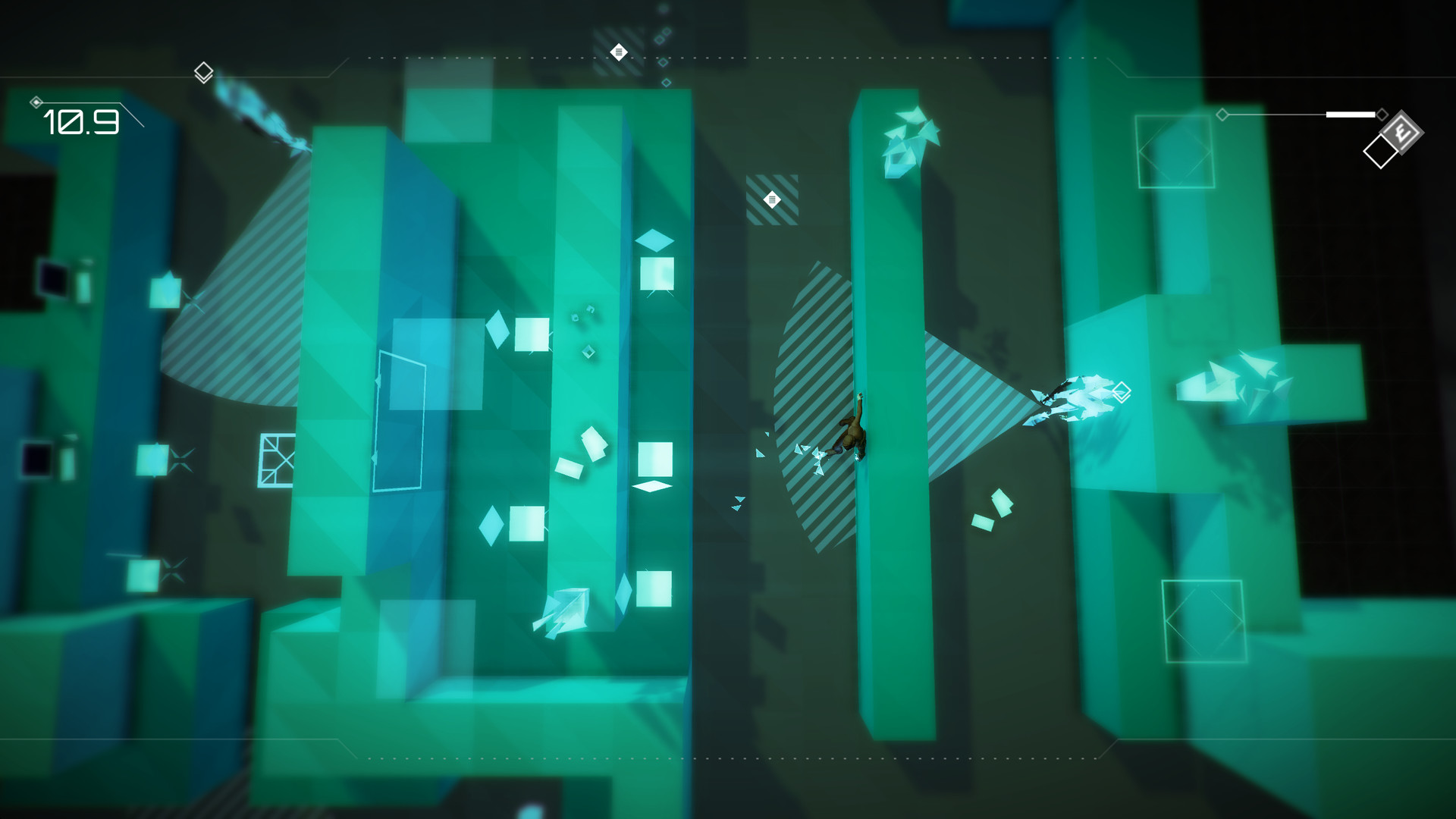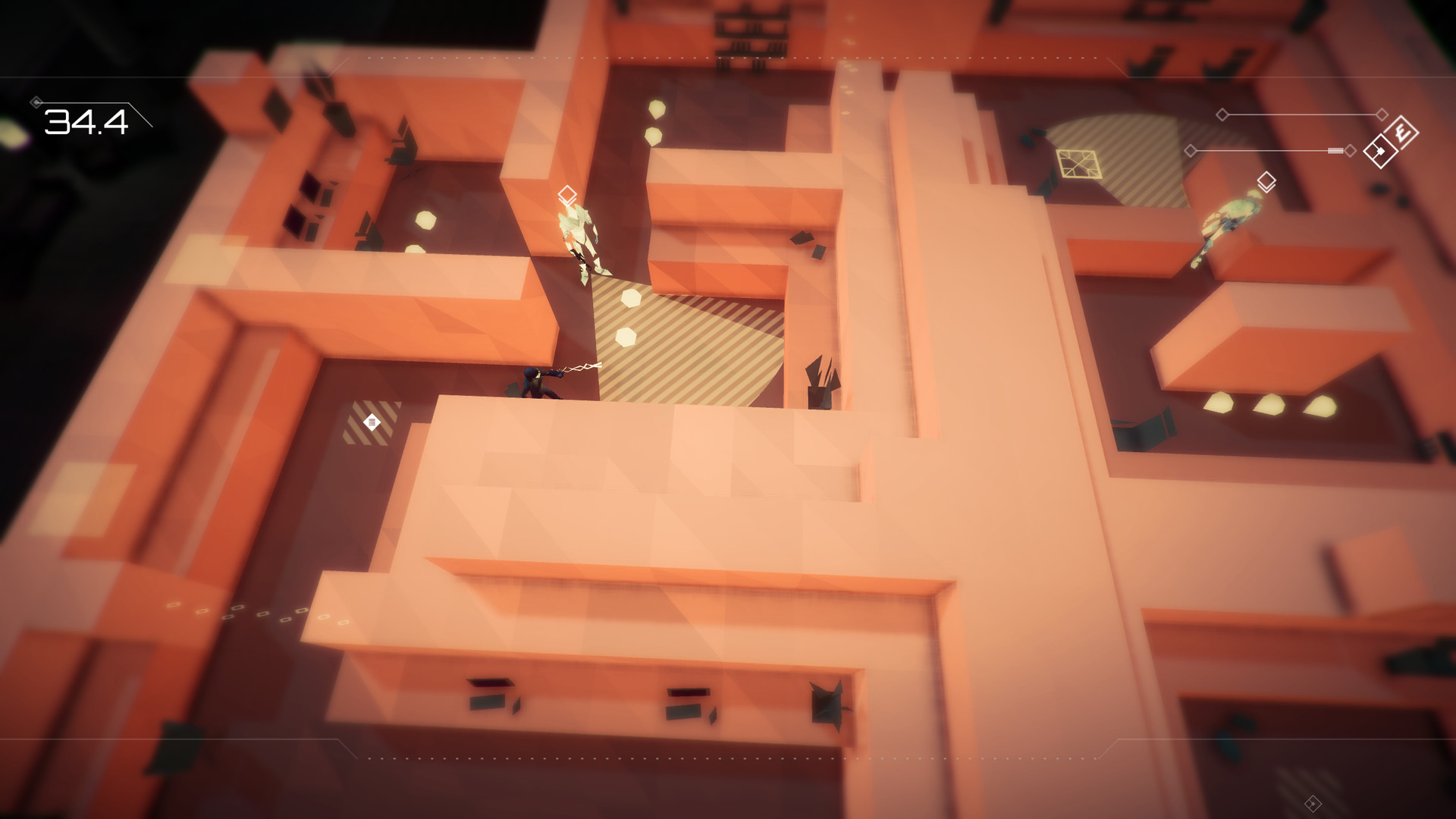Volume Review
Turn it down.
In my internal list of Things I Find Difficult To Admit, the only thing that tops "you will likely never actually go into space" is the knowledge that the Metal Gear Solid franchise has probably left a more significant and colourful legacy to the world of stealth game mechanics than the Thief series—my dear, beloved Thief—has ever done. Oh, sure, Thief's immersive sim systems were always more natural, more continuous, when stacked up against Metal Gear's discrete, video-gamey approach, but while the former simply iterated its way along with a handful of minor tweaks—culminating in a reboot that was, appropriately, like being trussed up in an S&M harness and smacked repeatedly with a blackjack—the latter has been the kind of non-stop font of new approaches and perspectives that we rarely see in the triple-A space. You really get the impression that Kojima changes things because he wants to try something new, not out of some unspoken obligation to move with the times. People bemoan the top-down games for their awkward controls and incongruously short-sighted enemies, but there's still some value in that format; to see the level spread out before you, a ticking, readable machine full of guard routes, camera arcs and hiding spots, all part of a shifting pattern that, if carefully scrutinised for long enough, reveals the perfect path. They were puzzles in motion, which is, when you cut out all the fluff, what most stealth games are really about. So, as the release of The Phantom Pain looms overhead, threatening to engulf us all like a rocket-punching, dog-rescuing, mech-riding tidal wave, let's dive back into that legacy and give the format one more spin with Volume, a minimalist stealth game about hiding in lockers and tricking clueless idiots. Ah, MGS2, it's like we never parted.

Volume reaches us via a team under the maker of the acclaimed Thomas Was Alone, Mike Bithell, and while I haven't personally played the latter game, my understanding is that it was basically about rectangles with feelings. I suspect the onus was on Mike to come out with another storytelling bombshell.While the plot isn't going to catch you off-guard—heck, the game might as well say "we're ripping off Robin Hood, by the way" in its Steam store blurb—the writing at the dialogue level is packed with enough warmth and wit to genuinely bring a smile to my face. Let it go on record that I was also legitimately really impressed with the game's premise, which neatly ties up the legend, a sci-fi setting, its own aesthetic and a frankly audacious excuse for its minimalist gameplay all into one neat package. You control Locksley—oh, that's not referential at all—a very English man with a slightly weedy voice, who has foregone wearing tights or shooting arrows with other arrows in favour of becoming a streamer. Not the kind that plays CS:GO weapon case roulette all day, either; he's commandeered an abandoned military training facility—with pricey augmented reality technology still perfectly intact, for some reason—and is using its equally English AI, named Alan, to construct representations of real-world locations and broadcast exact instructions on how to rob them blind. Brilliant, eh? What's interesting here is that for once—in the strangely prolific genre of human being completes arbitrary courses while an AI watches—Alan is the one in the dark, and it's only through the gradual unveiling of Locksley's secrets that we work out what's going on. I'm not sure how happy I am with this as a storytelling method, as it does feel like we're piloting Locksley more than actually being privy to his character, but it's a clever little inversion either way.
Alright, enough fussing, here's the deciding question: how much did you like the VR missions in Metal Gear Solid 2? You remember, those short, ultra-condensed levels where time was everything and mastery through repetition was king? If you never touched those levels—say, because they lacked exploration and improvisation and all the bonkers stuff that made Metal Gear so unmistakeably Metal Gear—then Volume is not your thing. On the other hand, if you have strange dreams about nailing the perfect run and spending hours hunched over a piece of grid paper planning optimal routes, then rejoice: Volume takes that pared-down formula, pares it down, and then pares it down again for good measure. There's something wonderfully straightforward about its goal of "get the gems, get to the exit, do it as fast as possible and try not to die", but while this starts off pathetically simple in practice—effortlessly weaving around the guards with nothing on your mind but beating the par time—the game gradually throws more and more elements into the mix until getting through a single level is an achievement in itself. I mentioned that Volume and its kin feel like they embody the stealth genre's absolute bare-bones identity as puzzles in motion, and Volume in particular seems to be trying to take that to a logical extreme. Everything is so neat, so binary; you can see enemies' cones of vision, but stepping into one is an instant alert. You can see the exact radius of the noises you make, but enemies who hear them will be one hundred percent suspicious, and when they go to investigate, will move one hundred percent predictably. There's a fixed, clear timer between being spotted and being shot at, and if that timer runs out while you're in line-of-sight, game over. No ambiguity, just all the elements laid out before you.

Now look, maybe some people think this is the right way to go. Ambiguity shouldn't be fun, right? If I step out in front of a guard, I don't want to bet the last few minutes of progress on whether or not I'm far enough away to trigger their "oh bother, I've lost my spectacles" routine. If I'm hiding in a pantry from a troop of armed goons, I don't want to sit there wondering whether or not one of them will check the only human-sized hiding place in the room. Right? We like to play with systems here, and what we really like are systems with outwardly consistent behaviour. And yet, without that ambiguity, without that fuzziness surrounding what can be heard, what can be seen, what can be done, the whole experience is just cold and emotionless. You'll never inch through the edge of a guard's cone of vision, praying with every fibre in your body that they're busy checking their phone or something; you'll never make a desperate break for the exit, zig-zagging here and there as gunshots whiz past your head. There's no tension, no hope, no fear, nothing but a flat-line of determination interspersed with spikes of frustration when you eventually bugger things up.
Still, if I was a speedrunner bearing down on a new world record, I'd probably want things to be clear-cut too. Volume is a game that clearly wants you to play fast, and competitively at that: the timer, ever-present on the screen, is your only measure of success regardless of how many alarms you clumsily trip, and the leaderboards on the level selection screen serve as an eternal reminder of how rubbish you are compared to some people you dearly hope to never sit next to at a dinner party. If you, like me, are the kind of perfectionist who can't bear the thought of going over the par time, then this means restarting levels over and over as you work out an optimal route, and while this is usually a fun problem-solving activity—look, maybe I really just like studying patterns—the level design doesn't always facilitate this, often expecting you to just wait for guards to slowly plod into position, or for your gadgets to slowly recharge. Checkpoints are kind enough to remember the timer, which I suppose was intended to stop people feeling utterly defeated the moment they mess up a section, but they don't remember guard routes or gadget cooldowns, so they're liable to throw you off anyway.
It's this focus—a focus on being the fastest, on restarting over and over until your name is proudly displayed on a meaningless virtual plaque, on finding the objectively 'best' outcome—that really just takes all the things I like about stealth games and sets them on fire. Creative solutions, like making the most of dynamic situations, just aren't welcome here. It's like being given a set of fine pencils, a wealth of fresh paper and a desk in a quiet room, but all you're allowed to do is painstakingly trace over printouts of somebody else's Sonic OC. I know gradually introducing gameplay elements is the courteous thing to do, especially when there are this many of the bloody things tucked away in there, but the game's complexity grows so slowly that non-linear levels don't even become a factor until nearly halfway through the story, and even then, they're more a case of "which path should I be picking first?" than anything like freedom of approach. It's the kind of game that really makes me question my definition of the term 'stealth game', when levels feel more like timed obstacle courses full of oblivious tossers than missions of actual infiltration.

But let's cool down for a moment and return to the matter of the story with big shoes to fill. As mentioned, the dialogue is wonderful—even if some characters seem to be under the delusion that they're on stage at The Globe, based on their grandiose monologues—but for a game with a handful of characters, only one of which you ever actually see, its focus can get a little bit strange. What exactly are you trying to say, Volume? The game keeps bringing up issues with major subplot potential—like the development of the AIs that oversee the training facilities and how they achieved sentience, but in kind of a chill, amicable way—but it foregoes properly exploring them in favour of pursuing its "he's fighting The Man with the help of technology and also it's the future" spiel, which even the most hardcore cyberpunks must be getting sick of by now. And what about the twist? Without wishing to spoil too much, it's predicated on people in the real world not acting exactly like they would in the simulation, and like Gordon Freeman being incapable of communicating through anything but frantic head gestures, this is exactly the kind of point I'd assumed we were just supposed to turn a blind eye to.
But what of the storytelling itself? In a strange twist of events, the text logs are probably the best part: they're short, sweet, littered with in-touch comments on social media and streaming, and cleverly written enough to add to the experience rather than detract from it. When people open their mouths, though, things get a little shaky. You know how Metal Gear Solid took years upon years to finally kick its habit of locking you in a featureless menu screen while characters talk your ear off? Volume actually has the power to make me look upon those eye-rollingly long codec calls in a favourable light. In Volume, everybody just talks around the action, and while this sounds like the sensible choice—tried and true in just about every other game under the sun—the difference between this and the codec calls is really just the difference between being forced into the iron maiden and being asked to voluntarily lock yourself in. Everybody's too polite to talk over the alert phase—again, a theoretically excellent idea that means you don't lose vital plot points while focussing on not being shot—and while the game is thoughtful enough to not simply skip lines of dialogue when this happens (or when you restart), it means that characters restart their lines more often than at the pre-school nativity play rehearsals. If you actually want to get through a conversation without attempting to chew your own ears off, the only practical option is to just sit around at the start of the mission and wait until everybody's finished yapping away, which puts us right back at square one.

Volume succeeds, it really does. If you want a metric ton of minimalist, top-down, time-attack stealth challenges where the focus is on squeezing out a perfect outcome in a controlled environment, Volume is only precluded from being the last word by its dodgy checkpoint behaviour and mile-long difficulty curve. But is 'minimalist' really something you want from a stealth game, or is that just a reflexive move against a world of games where everything is a bloated tangle of mechanics and side-activities? We may like to think that stealth games are ultimately about evading guards, and they are, but only in the same way that survival horror games are about managing health and ammo, or first-person shooters are about clicking on people’s heads. You can boil them down to their most basic premise, without sprawling levels or a bag full of tools, but somewhere along the way you lose what makes them special. No tension, no exploration, no improvisation; just a man running around in a skin-tight outfit, avoiding cones of vision and picking up shiny things.
And he doesn’t even get to fight a giant robot.
 Comments
Comments














